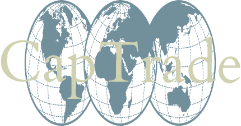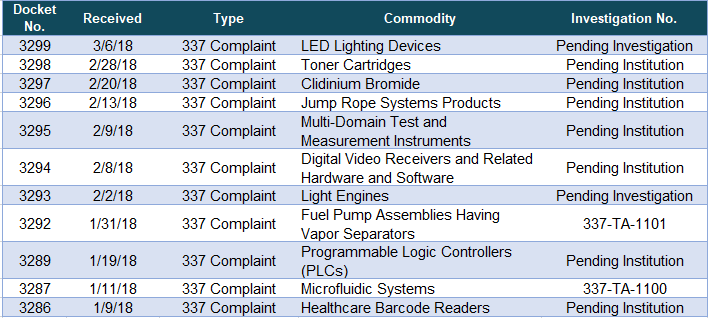New Petitions and Complaints Filed at the USITC
Under Title VII of the Tariff Act of 1930, U.S. industries may petition the United States International Trade Commission (USITC) and the United States Department of Commerce (DOC) for relief from imports that are sold in the U.S. at less than fair value (i.e. “dumped”), or that benefit from the countervailable subsidies provided by foreign governments (i.e. “subsidized”).[1]
Although it is only March, there have been numerous petitions and complaints filed at the USITC this year. The 701 (countervailing duty) & 731 (antidumping duty) Petitions include the following: [2]
Upon simultaneous filing of a petition with the USITC and DOC, the Commission conducts a preliminary phase injury investigation, which typically must be completed within 45 days of the receipt of the petition.[3] The USITC will find whether or not there is “…reasonable indication that an industry is materially injured or is threatened with material injury”, or whether or not the “…establishment of an industry is materially retarded, by reason of imports under investigation by the Department of Commerce that are allegedly sold at less than fair value in the United States or subsidized.”[4] The determination at this stage determines what the DOC does, because if the USITC determination is affirmative then the DOC continues its investigation, but if it’s negative, the investigation is terminated. There are several exceptions and nuances, which may impact the timeline of the investigation or other aspects of the investigation.[5] The CapTrade timeline tool [here] provides the approximate schedule for AD/CVD investigations.
The process for the 337 Complaints is different. Under Section 337 of the Tariff Act of 1930 the USITC conducts investigations into allegations of certain unfair practices in import trade. The large majority of these investigations revolve around allegations of registered trademark or patent infringement. Other investigations may involve misappropriation of trade secrets, false advertising, violations of antitrust laws, and other allegations of forms of unfair competition.[6]
Compared to petitions, there have been far more 337 Complaints filed this year so far. The 337 Complaints filed in 2018 thus far are listed below:[7]
CapTrade plans to post links to new petitions as they are submitted in the coming months.
Notes
[1] “Import Injury”, United States International Trade Commission, https://www.usitc.gov/trade_remedy.htm .
[2] “Recent Petitions & Complaints”, United States International Trade Commission, accessed March 9, 2018, https://www.usitc.gov/petitions_and_complaints.
[3] Commerce can extend its deadline for initiating an investigation, in which case the USITC must make its preliminary injury determination within 25 days after Commerce informs the USITC of the initiation. “Understanding Antidumping & Countervailing Duty Investigations”, United States International Trade Commission, https://www.usitc.gov/press_room/usad.htm.
[4] Id.
[5] One possibility is that it may be found by the USITC that imports from a country are negligible, if the imports from a country under investigation amount to less than 3 percent of the volume of all such merchandise imported into the U.S. in the recent 12-month period before the filing of the petition. There are exceptions to this rule. See Title VII of the Tariff Act of 1930 https://enforcement.trade.gov/regs/title7.html.
[6] Section 337 Investigations: Answers to Frequently Asked Questions, United States International Trade Commission, Publication No. 4105, March 2009, p. 1 https://www.usitc.gov/intellectual_property/documents/337_faqs.pdf.
[7] “Recent Petitions & Complaints”, United States International Trade Commission, accessed March 9, 2018, https://www.usitc.gov/petitions_and_complaints.


